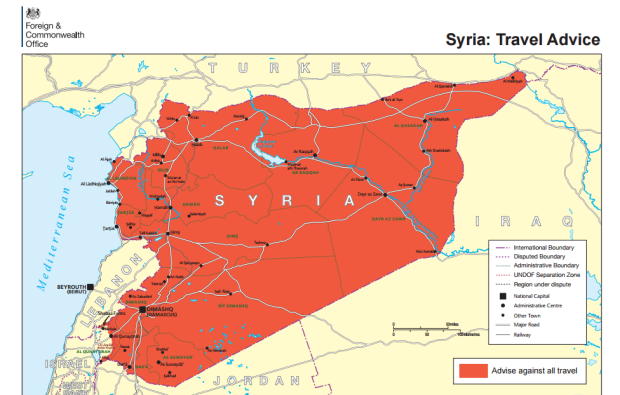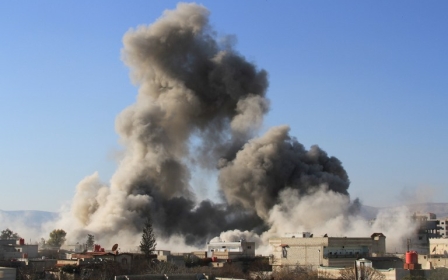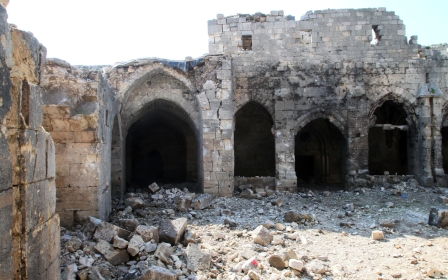Syria launches campaign to lure tourists to 'always beautiful' Tartus
The Syrian government has launched an offensive to get tourists to its "always beautiful" country in the midst of a civil war that has killed hundreds of thousands and laid waste to major cities.
The tourism board kicks off its campaign with a swanky video showing panoramic shots of beaches in Tartus, close to the protection of Russia's permanent naval base, and holidaymakers swimming and jet-skiing off Syria’s Mediterranean coast.
The video, published in late August, is the Syrian government's latest bid to entice tourists to the war-torn country and aid an economy crippled by five years of war.
Foreign tourism accounted for 14 percent of the Syrian’s gross domestic product in 2010 and was bringing in about $8bn a year, according to Syria’s tourism minister, Bishr al-Yazigi.
In 2013, 465,000 tourists visited the country, down from the eight million before fighting started in 2011, he said.
Yazigi also told Bloomberg in 2014 that Syrian, Iranian and Russian investors had been exploring potential investment opportunities in government-controlled areas.
“We’re betting on the tourism sector becoming a major support for the economy,” said Yazigi.
In a recent Facebook post, the Syrian tourism ministry said the country’s tourist industry had increased by 30 percent in 2016 in comparison to the previous year, according to statistics obtained by the ministry.
The ministry has staged similar campaigns by showcasing territory taken from Syrian rebels and the Islamic State (IS) group.
Earlier this year the ministry advertised trips to the ancient city of Palmyra and other parts of the country controlled by the Syrian government.
The government also published a video earlier this year showcasing numerous historical sites in Syria that have survived the civil war in comparison to many other historical sites like the Great Mosque of Aleppo which have been destroyed and reduced to rubble.
Some of the sites showcased in a previous video campaign also include the ancient city of Palmyra and the Umayyad mosque in Damascus.
The Syrian government co-hosted a Russian concert with the Russian government in the ancient ruins of Palmyra to commemorate Syrian forces taking control of Palmyra from IS in March.
Numerous countries including Britain and the United States have advised citizens against all travel to the war-torn country.
Both countries have also warned its citizens to not travel to Syria because of the "very high threat of kidnapping" as there have been a number of British nationals and other westerners who have been seized by armed groups.
It is unclear whether the Russian government have issued similar advice.
However, earlier this year, Russia advised its citizens against visiting Turkey and banned charter flights to the country after a Turkish air force jets downed a Russian jet on Turkey’s border with Syria.
Relations have since been restored as both Russia and Turkey met earlier this month to sign new agreements and rebuild relations.
Despite many commercial airliners stopping flights to Damascus following the onset of the Syrian civil war, direct flights to the war-torn country still operate from Iran and Russia.
The Syrian economy has contracted by more than 50 percent in real terms since 2011 with the biggest losses in output coming in the energy and manufacturing sectors according to a report published by London-based think tank Chatham House.
Syria’s population has also shrunk from 21 million to 17.5 million as a result of the civil war with a large portion of Syrians fleeing the country, and more than a quarter of a million deaths.
The Egyptian tourist board last year also pursued a video campaign to entice Western visitors to the country despite the ongoing instability in the country.
The campaign backfired after Egyptians used the hashtag #ThisIsEgypt to tweet images showcasing the realities of living in Egypt.
New MEE newsletter: Jerusalem Dispatch
Sign up to get the latest insights and analysis on Israel-Palestine, alongside Turkey Unpacked and other MEE newsletters
Middle East Eye delivers independent and unrivalled coverage and analysis of the Middle East, North Africa and beyond. To learn more about republishing this content and the associated fees, please fill out this form. More about MEE can be found here.





